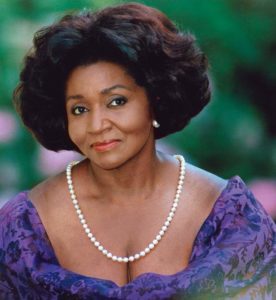
The Ring in San Francisco – How Grace Bumbry Broke Barriers
By Lois SilversteinSan Francisco Opera is in the midst of its month-long festival dedicated to Wagner’s “Ring Cycle.” In the coming weeks, Lois Silverstein will explore her experience not only revisiting the 2018 opera production but several of the events and panels presented by the company.
Grace Bumbry! Soprano eccellente! Magnifica! Barrier Breaker! Phenomenon.
Kenneth Overton, Grammy-winning Baritone, interviewed the iconic diva for San Francisco Opera’s Virtual Ring. Gracious, electric, ardent, feisty, remarkable, Bumbry made a stellar career, and broke barriers in the process, singing Venus in Bayreuth’s “Tannhäuser“, becoming the first Black opera singer to do so. The interview shone with praise, enthusiasm, sensitivity, and gave substantial information about some of the cultural highpoints in Grace Bumbry’s career. It was stirring.
Bumbry began following the trajectory of Marian Anderson, the first African-American recitalist in the U.S.A. She intended to be a concert recitalist singing Lieder and Oratorio. When, however, Jackie Kennedy learned of a possible audition at the Paris Opera, through a friend, Bumbry got her start.For a young girl from St. Louis, being in Europe for the first time was a daunting experience. And yet, there she was, at the Paris Opera about to sing Amneris in “Aida,” despite the fact that the director wanted her to sing the title role. It was here that the young American’s career took a turn for opera, and lucky for us. She went on to sing Carmen, which became one of her signature roles, and Eboli, among many other significant other mezzo masterpieces.
Fast forward to post-war Germany and Bayreuth, then in the hands of Wagner’s grandson, Wieland Wagner. From him, she received an invitation to audition for Venus in “Tannhäuser.” She became the first African-American to sing the role, and in Germany. Asked how she handled such a “coup” and such a role, Bumbry simply said, “when you’re young, you just do what you can do,” and, she noted in particular, “Remember, I had grown up in the U.S. I knew how to deal with discrimination.” Bumbry said, the tag, “the first black Venus, ‘die Schwartze Venus’ fell into my lap. I was black, and I was singing the role. That was it. I saw it as positive. “
She received 42 curtain calls for her Venus at Bayreuth, and one 30-minute call as well. She and Wieland Wagner discussed her singing Kundry later on, but that didn’t happen before Wieland Wagner died.
Bumbry “switched” to soprano roles more centrally when she worked with Wolfgang Sawallisch. She began to sing Elsa in “Lohengrin” and Elizabeth in “Tannhäuser” and noted conductors Herbert van Karajan and Karl Böhm saw her as best in that fach.
“You don’t have to do what others want,” she said emphatically, “so long as you get the sound you want. That is your sound. But you do listen to what notable musicians think.
“My voice had a wide range,” she added, and “I had the opportunity to use it.”
One strong affiliation on the stage was Grace Bumbry’s was with tenor Jon Vickers. Getting accustomed to his power and intensity was essential, Bumbry commented, and when they got used to each other, it was an excellent pairing.
Her connection to another notable African American soprano was Shirley Verrett.
“We had a wonderful camaraderie and a good rivalry. She had a wonderful voice and talent. How she could sing Rossini, ‘The Siege of Corinth,’ all the turns and curlicues was remarkable.”
Bumbry said she enjoyed learning more about Verrett’s voice through YouTube nowadays when she spends much of her time teaching and coaching and mentoring other young singers.
“That is my job,” and she believes in it. “Although I was in Europe during the height of the Civil Rights Movement, I felt like I was doing my part for the movement by singing as a representative of my people.”
She surely was, along with Leontyne Price, Martina Arroyo, Shirley Verrett, all actively singing at the same time. She quoted Fischer-Dieskau when she said we have to teach our audiences, and our singers, what they don’t know.
“Singing has to be done right. That is my job.”
Categories
Special Features

